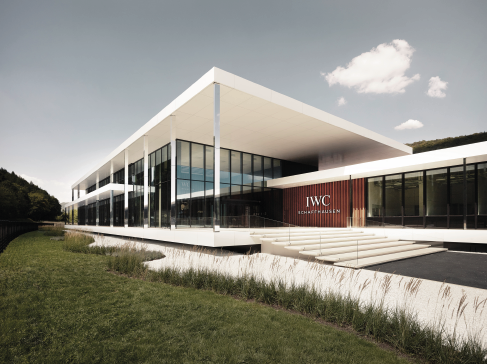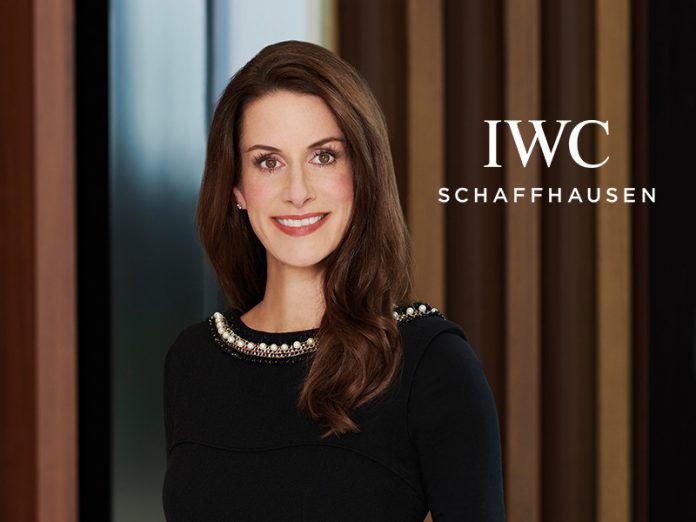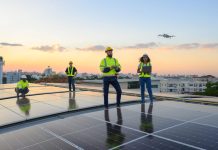Interview with Franziska Gsell, Chief Marketing Officer of IWC Schaffhausen, chairwoman of the company’s Sustainability Committee
Franziska Gsell has been the Chief Marketing Officer of IWC Schaffhausen since 2015 and also chairs the company’s Sustainability Committee. In this interview, she talks about what the Swiss luxury watch manufacturer does to become an environmentally and socially responsible company, and what it takes to create a great working environment.
Franziska, what does sustainability mean for IWC as a company and yourself personally?
Sustainability is at the heart of everything we do. IWC Schaffhausen has been manufacturing high-quality mechanical timepieces since 1868. Our watches are made with a combination of innovative technology and skills that are part of the cultural heritage of Switzerland, and they are designed to last for generations. The long life of our products is matched by our long-term thinking, and this concept of longevity has been further strengthened by the new My IWC programme, which we launched last November. It enables every buyer of a new IWC watch to apply for an extension of the International Limited Warranty from two to eight years. Given that sustainability is in the very DNA of our products, we want to manufacture them as responsibly as possible. For me, sustainability is also a matter of the heart. I consider it a very gratifying task to guide our company towards a more sustainable future.
 IWC Manufacturing Centre
IWC Manufacturing Centre
Can you tell us how you go about building a sustainable working environment, and how IWC contributes to the well-being of its employees?
Sustainability starts on your way to work. For example, we subsidise employee commuting by public transport. If you come to work by train or bus, we contribute towards your point-to-point travel card. We even have our own bus stop at our new Manufacturing Centre. Then, of course, we also want our employees to feel good while they are at work. The Manufacturing Centre is an ultra-modern production site, which offers excellent working conditions with lots of daylight and ergonomically designed workplaces. We also foster and encourage a diverse working environment. In our headquarters, we have people from many different countries, and we provide, for example, free language classes. When it comes to food, our canteens offer fresh and seasonal products, free fruit and there is always a vegetarian menu option in the menu of the day. We work tirelessly to build a workplace culture of trust and respect. In 2019, IWC became the first luxury watchmaker in Switzerland to receive certification from Great Place to Work. This organisation carries out a structured and anonymous online survey to find out how happy a company’s employees are.
To be sustainable means protecting the environment. What does IWC do to minimise the environmental impact of its business?
When Florentine Ariosto Jones founded IWC in 1868, he was not only a pioneer in the centralised production of timepieces. He also recognised the benefits of renewable energy at an early stage, using hydropower from the Rhine to drive his machines. We remain faithful to the ideals of our founder to this day and cover most of our electricity needs with hydroelectric power. In our new Manufacturing Centre, we generate part of the electricity we use with a photovoltaic system installed on the roof. What’s more, we are reducing our energy consumption using automatic lighting control coupled with LED lights, while a sensor-controlled sunshade system prevents the building from heating up unnecessarily. The water used for cooling and heating purposes is drawn from two groundwater sources. With many small steps, we have made a significant impact, and our efforts are paying off. In December 2018, for example, IWC ranked as the best-performing company in the Swiss watch and jewellery sector in a WWF Switzerland report, which examined the environmental impact of 15 brands.
Anyone who wishes to run a business sustainably needs to take a critical look at their supply chain. How does IWC ensure its suppliers meet the most exacting standards?
Because we are a company in the luxury sector, the sourcing of raw materials is a sensitive issue, which we take seriously. Since 2012, we have been a member of the Responsible Jewellery Council (RJC), and place great value on the certification RJC offers us and our suppliers. This certification means that our suppliers of, for example, gold and diamonds, must meet strict, independently audited RJC standards regarding the social and ecological impact of their business. We are also the first luxury brand in the Swiss watch sector to meet the new Code of Practices (COP) set by the Responsible Jewellery Council (RJC), published in 2019. Ultimately, our goal is to establish a fully transparent supply chain, in which every single part of a watch can be traced back to its origin. This is our long-term vision, and we are continuously investing in improving transparency.
Can you tell us what other steps you are taking to guide IWC towards a more sustainable future?
Sustainability is a journey that is never finished. A recent example of our efforts is the reduction of plastic. In January 2019, we signed the Ellen MacArthur Foundation’s New Plastics Economy Global Commitment. By doing so, we pledged to eliminate plastic we don’t need and to ensure that all the plastic we use in our packaging is 100 per cent reusable, recyclable or compostable by 2025. We are also extending this approach to the other plastics found throughout IWC. In April 2019 we replaced our watch boxes, introducing a small, high-quality travel pouch that protects watches and is also a desirable product in its own right. This can be accompanied by a larger box for gift-givers or watch collectors. Through this, we reduced the average weight and volume of the boxes by 30 per cent, and use 90 per cent less plastic than previously. We also show that luxury needn’t be synonymous with waste or excess, and that we can act sustainably while still meeting our highest standards of quality.
When it comes to sustainability, transparency is essential. How do you monitor and measure your progress?
In 2018, we became the first Swiss watchmaking company to publish a sustainability report following the best-practice standards of the Global Reporting Initiative (GRI). In this report, we committed ourselves to achieving eight measurable sustainability targets by 2020. We are about to publish our new report on sustainability. Once again, we will outline our activities regarding sourcing, the environment, IWC as an employer and community investment. We will explain how far we matched our 2020 targets, and what our objectives will be for 2022. Our progress can be tracked and challenged by the public.
IWC has also been awarded the Positive Luxury Butterfly Mark. Can you tell us why it is beneficial?
Consumers are increasingly interested in sustainability, and they do care about how products are made. However, they often don’t have the time to do their own research to find out which brands best reflect their personal values. Positive Luxury’s Butterfly Mark is a third-party seal of approval that identifies those luxury brands that meet the highest standards. At the point of sale, it contributes to more transparency and, ultimately, helps consumers to make more informed purchasing decisions. We first received this award in 2014.
Let’s talk about community investment. IWC partners with organisations that work globally to support children and young people. Can you tell us more?
Currently, we partner with Laureus Sport for Good and the Antoine de Saint Exupéry Foundation for Youth. Laureus was established in 2000 and harnesses the power of sport to bring about social change, working to create a more promising future for disadvantaged children and adolescents. This worldwide organisation currently supports more than 160 sports programmes in 40 countries. We have been a Global Partner of Laureus since 2005 and present a special edition Laureus timepiece every year. These watches are engraved with the winning entry from a drawing competition for children that we organise within the foundation’s projects. Our partnership with the Antoine de Saint Exupéry Foundation for Youth started back in 2009. This foundation was created by the heirs of the great French pilot and author, and works to preserve his humanist values. It supports various projects in the fields of education and culture, and works, for example, to combat illiteracy. We have donated an exclusive watch to the cause every year since 2013, which is then auctioned to raise money for the foundation.
What can companies from other sectors learn from IWC’s approach to managing sustainability?
You have to realise that sustainability is a mindset. Like a filter, you need to apply it to everything you see around you. When you look at any area in your company, you always have to challenge yourself; are we doing everything we can to be as sustainable as possible? Is there something we can improve? I also recommend involving your employees in the process. The specialists in our Manufacturing Centre, for example, know their operations inside-out and often come up with surprising ideas. Recently, a visit to the IWC Manufacturing Centre inspired our brand ambassador Hayden Cox to implement a groundbreaking new approach to reusing waste in his own surfboard factory. It is important to have a constant flow of information about sustainability topics. It’s crucial to sharpen people’s vision and to encourage them to make contributions.
Franziska, thank you so much for taking the time to talk to us. Is there a final aspect you would like to share with our readers?
Sustainability is a journey, a constant evolution. The more you think about it, the more challenging it gets – but also the more fascinating. IWC wants to be an industry leader in this field. It is my wish that we can achieve our ambitious goals and targets, and to move IWC Schaffhausen towards a fully sustainable future. I also hope that we can inspire other companies or other organisations to do the same.
Executive Profile
 Franziska Gsell has been the Chief Marketing Officer of IWC Schaffhausen since 2015 and also chairs the company’s Sustainability Committee.
Franziska Gsell has been the Chief Marketing Officer of IWC Schaffhausen since 2015 and also chairs the company’s Sustainability Committee.




































